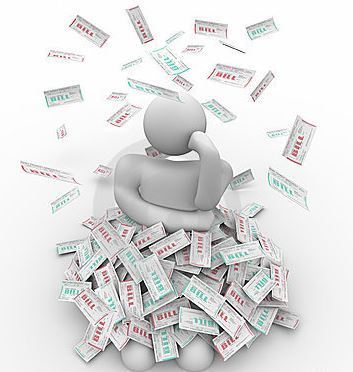Steve Prentice's Blog, page 19
March 22, 2012
Get those bills out of sight!

Unsightly bills!
This is the time of year when everyone gets serious – paying taxes, focusing on financial responsibility, performing the penance of life. Most people dislike doing taxes and paying bills because it is not enjoyable and can be a major source of procrastination and stress.
Here is just a little tip to make one part of this a little easier: keep your desk clear, and your mind will follow. Here’s what I mean:
When you receive a bill in the mail, what do you do with it? Most people leave it lying around as a reminder to pay the darn thing. Pretty soon this leads to a pile of ugly looking envelopes, lying in a stack in the kitchen or by the computer, reminding you in their passive yet nasty way that they are still waiting to be paid.
Clutter affects thinking. Your short-term creative memory needs all the help and space it can get, and when too many items fill its field of view, clear thought is pushed away. You might not think this happens to you but it does. You might not think it means a lot, but it does. Clutter obfuscates clarity, and leads to procrastination and resentment of tasks. Your personal success is dependent on being able to think clearly, plan, negotiate and influence.
My suggestion is simple and clean: whenever you receive a bill in the mail, open it, and note down in your calendar the amount and its due date, allowing three days or so for processing (for online banking), then file the actual bill away. That’s it.
This leaves you with a clean working area without losing track of the bills you have to pay.
Bills will never go away, but it is always worth it to live every minute of your life free of dark feelings and fear. A clean workspace devoid of “threats” is a humble but powerful step on that path.


February 20, 2012
Problems getting to sleep?
 Recently a past workshop participant asked me for advice on how best to fall asleep. Her mind gets too busy with thoughts, which leads to one of the classic problems of working people – sleep deficit.
Recently a past workshop participant asked me for advice on how best to fall asleep. Her mind gets too busy with thoughts, which leads to one of the classic problems of working people – sleep deficit.
To wind down towards healthy sleep, one must first remember that the build-up towards sleep is a gradual chemical process, in which the body introduces the hormone melatonin into the bloodstream bit by bit. As such, rule number one for getting great sleep is to see the entire evening as part of this build-up process, so focus should be placed on relaxation, not work issues.
Relaxation is a very personal thing, and refers mainly to an emotional-chemical state rather than just being physically passive. mainly it comes down to fun. Vigorous sports, such as skiing, basketball or working out can be relaxing, because even though they are vigorous, they are mentally relaxing, which allows the release of Melatonin on-schedule.
By contrast, evenings filled with extra work left over from the office, or even doing life-related work such as bookkeeping, paying bills or things like that, are really not enjoyable and as such stimulate the body to work against itself, the sleep build-up process and stimulating it into action.
Rule number two for great sleep: If your mind tends to race and to seek out things to worry about during the evening, give it something else to do. Hobbies, reading, watching a movie, FaceBook, whatever interests you. A racing mind has be calmed, either through distraction, or by writing your ideas and thoughts down. By writing your ideas or plans on paper, you give your mind permission to let go of them by transferring them to a tangible surface.
The goal is to avoid having to lie there tossing and turning, by bringing sleep on in a slow, gradual fashion over the 7:00 p.m. to 10:00 p.m. period.
If you wake up in the middle of the night and find it hard to get back to sleep, it helps to understand why. The act of sleep is not a single continuum. It consists of five discreet phases, inside each of which different activities happen, from light dozing at the beginning throught to Rapid Eye Movement (REM) sleep. Each of these phases is identified by different electrical outputs from the brain, and we pass through this collection of five phases three, four or five times a night.
Sometimes if you awaken, either naturally, or due to a noise, at the conclusion of the five phases your mind and body might consider the act of sleeping concluded, at least for the time being.
Many people get stressed at this point, afraid they will not get back to sleep and that tomorrow will be ruined.
Here then is a list of techniques and ideas to help.
Don’t fret the loss of sleep. People have been able to function on three or four hours of sleep. More is better of course, but most people will be ble to get through a day on just a couple of hours sleep.
Cover your clock. Lying there, watching the minutes tick away just increases stress and delays relaxation. Cover it up and don’t worry about it.
Move to another room. If sleep still won’t come, move to the living room and read a book – an enjoyable one, not related to work – under low light.
Eat some natural sleep inducing foods. The best is quite simple and quite tasty: simple cornk-based cereal such as Corn Flakes with some milk and honey added is a good sleep assistant, since this combination of natural ingredients allows the passage of tryptophan into the bloodstream to assist in sleeping.
If sleep deprivation lasts for many days, it is advisable to see a physician, of course, but the best rule of thumbis to remember that the sleep process actually stats in the late afternoon and builds up to the actual act of sleep over many hours. Anything you can do to end your workday and allow the evening to be used for relaxation only will be to your advantage.
The best ingredient in a productive workday is the quality of the sleep you had the night before, so any guilt you might feel about wanting to do extra work in the evening must be balanced against the truth that rest tonight equals top-level performance tomorrow, whereas work tonight is just borrowing tomorrow’s energy.





